
The death of local news
Did you have a good Easter? The sun shone and our village was enjoying the local pub’s beer festival. It had been trailed in the parish mag and loads of stuff was lined up, including a pétanque competition and all-day fish and chips on Good Friday, live music and a hog roast on Saturday, roast meat yorkie wraps on Sunday and half-price festival ales on “drink us dry” bank holiday Monday.
The pub has really come back to life over the past couple of years, since being taken over by the new young landlord. The couple who ran it before him had done their best after their predecessor – and his dwindling clientele – had pretty much given up the ghost. But they had the pandemic to contend with and did well to keep the place alive with takeaway-by-appointment food.
Nat came in as a breath of fresh air and the place got its buzz back. Clearly there for the long haul, he set to work on the beer garden, putting up trellises and pergolas, planting beds as well as knocking down a high fence that separated it from the church (not to everyone’s delight, it has to be said), so making it easier to go between the two. That would have been useful when trying to muster my wayward family for the photos after my daughter’s wedding.
What’s more, he has recently joined the parish council. You could say he’s quite the local figure these days. Like most people who take centre stage in village affairs, he has his supporters and detractors, but all in all, everything seemed to be going pretty well. The pub was heaving on Good Friday night.
On Easter Saturday, my husband came back from the shops to say “Nat’s in hospital. He’s had a fall and punctured a lung. Ambulances all over the place and the air ambulance called out.” He had learned this from a friend who lives next door to the pub. Another neighbour, who had gone to the church to do the flowers that morning, also reported the ambulances. It later turned out that Nat had been injured in the early hours, had gone to bed and woken next morning to find himself bleeding heavily. A friend found him and dialled 999.
The pub remained open on Saturday, though as you can imagine, the stuffing had been knocked out of the festival. On Sunday, the police turned up and cordoned off the pub as a possible crime scene. A bit late you might think. Fleur and Jack and the other TV scientists would have had a fit.
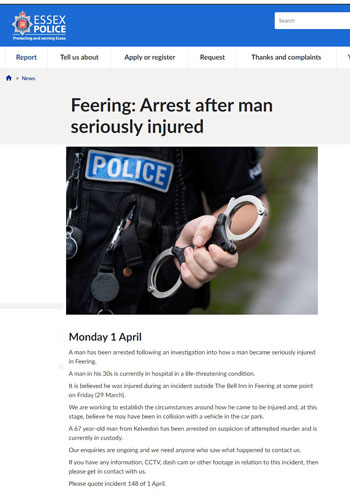
On Monday, they posted an appeal for witnesses on their website saying that a 67-year-old man from the neighbouring village had been arrested on suspicion of attempted murder after “a man in his thirties” was left with life-threatening injuries. It was thought that he had been “in collision with a car”. There was an appeal for witnesses or any dashcam footage that anyone might have had (because there are loads of people with dashcams driving up and down a country lane at 2.30am – but you can but hope, I suppose).
The arrested man was subsequently bailed. Nat had been taken to Addenbrooke’s in Cambridge – 50 miles away – by air ambulance and put in an induced coma. He was later transferred to Papworth, also in Cambridge. He remained sedated for about ten days and is now reported to be making progress. He is well enough to have telephoned the people rallying round to keep his pub going. We are all hugely relieved.
So now, finally, I shall come to the point. That Essex Police statement from Easter Monday was written almost in journalistic style – although it left the “attempted murder” bit a bit low and included the usual sort of police-talk of “ongoing enquiries”. So it was easy for reporters to reproduce it with a tweak here or there. The same four or five paragraphs could be juggled around and spiced up a bit by substituting “fighting for his life” for “life-threatening injuries”, but basically the same information could be imparted with almost identical phraseology.
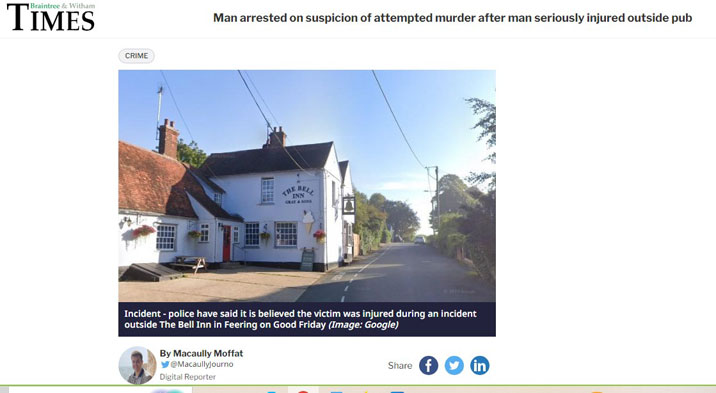
And that is exactly what every single local news outlet did. That includes the Newsquest-owned Colchester and Braintree papers, the Reach-owned Chelmsford paper, the Archant-owned East Anglian Daily Times, the BBC and ITV. Two of the stories put up online were bylined by a “chief reporter”. The print weeklies, published on Thursday and Friday did not move beyond that initial statement – even though the arrested man had been bailed by the time they went to press.
Most did not trouble with the story after the initial report, although the BBC and Essex Live (the Reach-owned Chelmsford-based website) did run follow-ups on the release of the arrested man – Essex Live including a quote from “a police spokesman” that was yet another straight lift from the force’s website: “Our enquiries are ongoing and we need anyone who saw what happened to contact us. If you have any information, CCTV, dash cam or other footage in relation to this incident, then please get in contact with us. Please quote incident 148 of 1 April.” Still, I guess it was honest enough in the headline about the effort it had put in – “Police issue update as man fights for his life after crash”. Except we don’t know for sure that there was a crash.
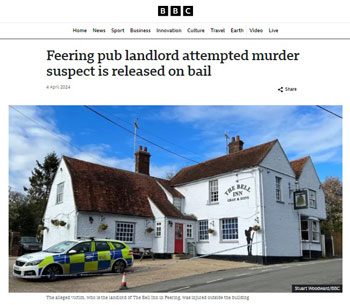
Not one local journalist did so much as put in a single call, let alone venture to the village. They couldn’t even be bothered to find out who the “victim” was. (I put “victim” in quotes because no one other than the people involved yet knows exactly what happened). There was no reason not to identify him. Indeed, the BBC update was headlined “Pub landlord attempted murder suspect released on bail” as though that nugget was already in the public domain. In fact, that was the first and only time the identity of the man “fighting for his life” had been even hinted at. And he still wasn’t named.
What is going on here? Did these local organisations think that because the police hadn’t issued a name that they weren’t allowed to use it? Or, more to the point, even try to find out who he was? If it were a young girl who was in hospital, rather than a grown man, might their antennae have twitched a bit more?
This wasn’t the biggest news story in the world, but it was a news story. A fairly prominent local figure, at the heart of a big (for the area) holiday weekend event, had been seriously wounded in what you might call a “mystery” incident. Was the lack of interest in spite of or because of the fact that it was Easter? Wouldn’t you think that on a slow bank holiday news day, it might stir someone to pick up the phone? Or were the small staffs too busy covering Easter egg hunts and fetes and whathaveyou? Some hope!
Ah… pick up the phone? But who would they ring? Because no one does local calls anymore, no one builds up contacts. Certainly not in little villages. And getting off your chair and going into the pub or knocking on neighbouring doors to ask the odd question would be impossible: who would be left to do all the website updating and social media? The BBC did at least run its own photograph, rather than the Google shot favoured by everyone else. But therein lies a mystery. The byline is Stuart Woodward and there’s a Stuart Woodward who describes himself on social media as reporter / producer for BBC Essex. If he actually went out there to take the picture, why didn’t he do a bit of reporting while he was at it? The accompanying text had no byline.
There was quite a story to tell here, while staying well within the contempt laws. But nobody bothered to find out. Why should they? They probably thought no one outside of the area would be interested. Possibly rightly, but maybe not – what about people elsewhere who knew Nat from before he moved to the village. And since everyone on the spot who was interested knew much more about it than the reporters on the newspapers and websites, there was no point in their looking at the meagre coverage.
So the news outlets didn’t report a story properly because of lack of manpower, lack of legal knowledge, lack of local contacts or a perceived lack of audience interest; while local people didn’t bother looking at those news outlets because they knew all there was to know from their own sources.
And there, my friends, is the death of local news in a nutshell.
Ad nauseaum

Meanwhile, Reach’s purge of journalism continues in favour of pap and clicks. Opening the Google Chrome app on the phone brings up a search box, icons for a few previously visited sites and a screed of “news” under a “discover” tag. This is presumably tailored to stuff in which you have shown an interest elsewhere. The local news headlines I understand, but I’m not sure about all the Death in Paradise gossip. (Oh yes, now I get that. When watching TV, it’s a family tradition to google actors you think you recognise from other shows – and they have frequently been in Death in Paradise or Midsomer.) There are also a lot of gardening tips. Heaven knows how many times Google thinks I need to be told when and how to prune my hydrangeas.
This week, I fell for one of these clickbaity headlines: “How to get rid of ivy for good”. This was courtesy of a Daily Express “lifestyle reporter” called Angela Patrone. Now you know what’s coming, but I’m going to go through this every inch of the way. Because it’s so painful. And because this is what is killing real journalism.
We start with a headline, a sub head, byline and sharing links. Then there’s a small notice that the article contains “affiliate links” from which the site might receive commission. Then there’s a file pic.
Then there’s one sentence: “Ivy’s resilience and lush growth make killing the plant quite a tricky task – but not an impossible one.”
And then there’s an ad. Followed by a video trailer.
Then there’s another sentence telling us that a “gardening enthusiast” has taken to YouTube to share “the easiest way to get rid of English ivy forever”.
The next sentence reads (I kid you not): “She said: ‘This is truly the easiest and most effective way to get rid of English ivy forever’.”
Then there’s an ad. In the normal course of events, I’d have given up by now. But in the interests of boring you to tears, I persevered to the very end.
Brittany, our gardening enthusiast, explains in two sentences that ivy is a nuisance that grows out of control, chokes trees and gives rodents a hiding place.

Next up is an invitation to “Read more” – on “the best way to prune hydrangeas” (what was I saying earlier?). Then an opportunity to stay up to date by joining the Express on WhatsApp. This is followed by a picture of a cute mouse perching on a bird bath (a rodent that could take cover in rampant ivy). Then there’s a link to Brittany’s YouTube guide to how to get rid of ivy forever.
Why anyone would then stick around to read the Express’s re-rendering of this information is anyone’s guess, since by clicking they could get the information from the horse’s mouth rather than filtered by the lifestyle reporter. Unless they happened to be researching for a publishing trade magazine.
Now Brittany has become an “expert” and she claims that with her method, you don’t need to break your back pulling the ivy out by hand. Instead, guess what, her method is the “quickest and most effective way to get rid of the plant”. Haven’t we heard that somewhere before?
Pause for another ad.
Then we get three whole paragraphs without interruption. These tell us that Brittany starts by putting on protective gear and goggles and suggest tools that you might like for your ivy removal operation – a string trimmer (like this one from B&Q for £37), a lawnmower (like this one from B&Q for £59) and some garden loopers (I think she means loppers), like these on offer from Gardening Express for £8.99.
Gosh, after all that information, the reader needs a break. So why not sign up for gardening tips and advice to your inbox from the Express. Click here to subscribe.
And don’t miss: roses grow the most amazing blooms ever seen if essential kitchen scrap is used [EXPERT]
Slugs and snails will stop eating your plants with expert’s 3 effective methods [TIPS]
Four plants that must be pruned now for more vigorous blooms come summer [INSIGHT].
I don’t know what the caps in square brackets tell us, but I bet you anything that those four plants that must be pruned now include hydrangeas. I didn’t click.
Time for a picture of a man wielding loppers. The caption says to cut the trunk of the ivy with the loppers. He’s pruning a stem from a hazel tree, but no matter.
Now there’s a further sentence of advice, “resist the temptation to pull the vine from the tree”. And then a link to “similar articles to this” (which is mysteriously a picture of the NHS Tavistock centre, leading to a story about the reopening – or not – of its gender clinic). Then another ad.
We then get three whole sentences of Brittany’s wisdom before a chunk of “trending” links – gravel, orchids and moss – and a file picture of a woman with a sprayer. She is actually aiming at ivy this time. But that little mister isn’t going to do much.
And, finally, we have three more sentences which include links for you to buy a rake from Wickes or a hoe from Gardening Express.
Once the piece is finished, there’s a list of related articles, including “peace lilies explode with so many flowers when adding 89p item to their water”. They all follow the same format. Talk about what you’re going to tell someone, but don’t actually tell them until they’ve scrolled through reams of crap. It’s widely used on blogs and recipe sites – want to know how to make a simple cheesecake? I’ll tell you eventually, after I’ve told you all about how my family love cheesecake and friends can’t get enough of it. And how it uses a really common ingredient that’s in your store cupboard, but I won’t tell you what that is until the last possible moment.
It’s a nightmare. But we know that those bloggers and Instagrammers need to do this to get their “affiliate” deals. Reach is going down exactly the same route – and is making no bones about it. The chief executive has explicitly said that they need the clicks to keep the business going. But Reach isn’t some wannabe influencer or blogger with a YouTube channel. It’s supposed to be a respectable news publisher. It has five national newspapers and hundreds of local titles. Yet it is sacking journalists and “investing” instead in this nonsense. Things are so bad, remember, that the editor of the Daily Mirror took voluntary redundancy. Can you imagine that? The dream job for generations of young journalists. It doesn’t bear thinking about.
And that, my friends, is the slow death of two national institutions – the Mirror and Express – in a nutshell.
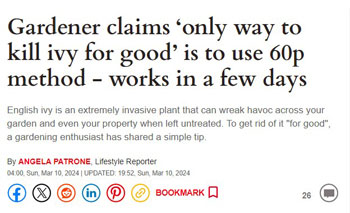
Just when you thought you’d had enough ivy…
I went back to my laptop to take some screengrabs to go with the ivy saga and googled “Express get rid of ivy”. Guess what I found? A whole other screed, also by Angela Patrone, that was posted three weeks before the Brittany guide. This time someone called Steve Cockrill had gone on Facebook and asked advice and now Angela was mining the replies to generate copy. Which came down to two people recommending household bleach (Brittany had gone for weedkiller or white wine vinegar). At least the pictures and videos this time were more appropriate.
This is journalism? Trawling social media forums and regurgitating the questions and answers?
I despair, I really do.
Showing another (better) side of journalism

It’s not all doom and gloom, though. There is some good journalism being done out there – and on subjects that do not slavishly follow the government or publisher’s agenda. Step forward the i paper with its story about people buying houses on new estates who are being asked to sign non-disclosure agreements before they are even allowed to look at the terms of the maintenance contracts the developers require them to sign.
This is not just the equivalent of being asked to sign a blank cheque; it is exactly what they are being told to do. Who knew? And, more to the point, why did no one else pick up on this story? Too busy chasing the Mail’s tail on Angela Rayner (inevitably, more on that later) or counting arrivals on small boats.
The i had another good ‘un a couple of days later with the compelling front-page puff, “Major HS2 factory facing closure before it can make a single HS2 train”. Alstom’s in Derby has been building trains for nearly 150 years and it is supposed to kit out rolling stock for the new high-speed line, if any of it ever happens. But its order book for the immediate future is empty and there are fears that the factory may not survive the 18 months before the HS2 contracts are expected.

That would mean the loss of 1,300 jobs on site and up to 15,000 in dependant industries, not to mention the plant and the expertise that go with them. You can’t just mothball factories and lay off staff and expect them to spring back to life a couple of years later. Hitachi, whose factory in County Durham is supposed to build the trains, is in a similar position.
The factories accuse the government of a lack of interest, the government says it’s looking for solutions and denies that it is to blame for Alstom’s woes. But having already shown its ambivalence towards the HS2 scheme and with an election in the offing, it’s hard to see the government speeding to the rescue.
So this is a story in the public interest. It also seems to be an example of a reporter paying attention to specialist media and finding real stories beyond the police and government handouts. For Rob Hastings’s report credits the Green Signals podcast. Good on both of them.
Giving a voice to the voiceless
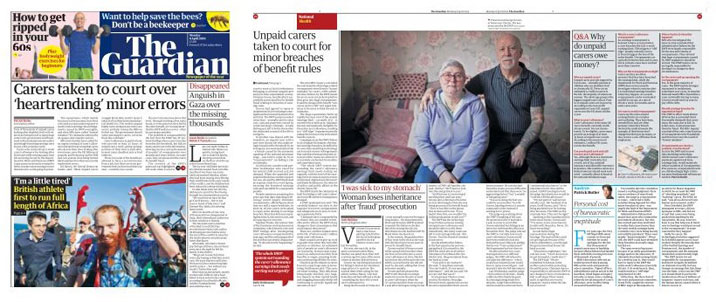
The Guardian, too, has been on the money with a story which, like the house-buyers’ NDAs, has been hiding in plain sight. In this case, the way the carers’ allowance works. The paper splashed last week on people who had been taken to court and had to pay thousands of pounds for earning as little as a pound more than they were allowed to.
Those claiming the allowance of just under £82 a week can earn a further £151. If they earn £152 they lose the entire benefit, not just the extra quid. There will, of course, be “benefit cheats” who conceal their other earnings, which may add up to a great deal more than £151. But the Guardian is concerned not with them, but with people for whom a small pay rise can mean a huge amount of trouble.
It seems that the DWP is not exactly pro-active on this. The paper has examples of claimants who had notified the department of their income – one who wanted to surrender the benefit entirely – but whose cases had been left unattended. Others had made small mistakes and didn’t realise they’d gone over the limit. So, do the sums. If you had a part-time job on £150 a week – within the limit – and had a 3% pay rise, that would put you on £151.50. If you didn’t tell the DWP – and, in some cases, even if you did – you would have had a total income at the end of the year of £12,142. And you would owe the DWP £4,264. Without that pay rise, you would have had £12,064 to keep.
The measures being taken to chase people who are by definition among those with the lowest incomes in the country are draconian. Having done little to tackle the problem of overpayments, the DWP has been taking claimants to court for fraud, where they have been fined and where one woman saw her modest inheritance from the mother she had cared for confiscated.
Some may say, “well, they must have known they weren’t entitled to the money, they shouldn’t have spent it”, but just try living on £12,000 a year while looking after an elderly parent or a disabled child.
Once again, this wasn’t followed up elsewhere.
Express does the maths

The Express, as it happens, was also concerned about problems with caring for the elderly. In this case the people on the receiving end, splashing on a report showing that while care home charges soar, one in five is rated inadequate or needing improvement. This, the paper said, was a care home crisis that “shamed Britain”.
The next day, it was demanding an end to the long, cruel waits for cancer care – but was happy to report two days later that Rishi had a radical plan to fast-track care and free up beds. Then the paper was back seeking an end to the “triple lock pension injustice for millions”. Oh, not again!

Well, kudos to the Express for sticking up for its core audience. There has been so much hoo-ha over the triple lock: foot-stamping about how it must be maintained, challenges to Labour, pledges from the Conservatives, while others railed about generational injustice and the cosseted boomers. Why should those oldies get special treatment (apart from being ignored in the budget), an 8.5% rise when public sector workers who had put their lives on the line protecting the elderly during the pandemic are offered only half as much (clue: because, unlike the young, they can be relied upon to turn out on election days).
But now it turns out that pensioners are not all getting an 8.5% rise. Only those aged between 66 and 71 (or 73 for men) are. Because anyone older (which two-thirds of recipients are) is on a different system. Nowadays, there is just one basic state pension. But before April 2016, the pension was made up of different bits and pieces of which the basic allowance was only a part (albeit the main part). And the full pay rise – equivalent to the increase in average wages under the triple lock – applies only to that basic element, while the other bits, from SERPS or pension credit for example, have gone up by the inflation rate, which was lower at 6.7%. This means that older pensioners are up to £200 a year worse off than the younger ones. And the gulf will grow as future increases take effect.

Oh the peril of over-promising. If the pension had gone up by 6.7%, it would have been in line with other benefits and still better than the rises for most people still in work in the public sector. But by trumpeting that 8.5% figure, the government failed to give an honest picture. And now it has been found out. By the very paper that was most excited by the deal in the first place.
Rifkind sticks to his guns

On to the Times and a bombshell front-page story that most of those homes in Kigali where Suella Braverman was admiring cushions destined to ease the backs of deported asylum-seekers have been sold – to Rwandans. So, there are fewer than 50 left for our rejects.
What is particularly interesting here is not so much what went into print, as what went on social media afterwards.
In its report on the sale of the houses, the Times quoted a Rwandan government spokesman as saying: “Bwiza Riverside Estate is just one of the housing options where migrants will live alongside Rwandans. None of the assigned housing estates were ever meant to be only for migrants. The idea is to integrate migrants into Rwandan communities, not create migrant ghettos.”

Fair enough, but now enter Times columnist Hugo Rifkind, who reminded followers last week of a thread he had tweeted in March last year. A thread which, he said, had prompted the Home Office to ring him up and accuse him of lying.
That thread started: “All the Braverman photos show her visiting the building site of Kigali’s Riverside Estate, as if it were being build specifically to house our asylum seekers…”
He continued: “It isn’t. It was being built anyway. It’s just a Kigali housing project…so the whole thing is her going ‘THIS IS WHAT A HOUSE LOOKS LIKE’. Super.”
That was the point where the Home Office intervened, prompting the third tweet in Rifkind’s thread: “I should say, the Home Office has been in touch to say this isn’t true. I’m not taking it down because…er, I think it is? Attached is the first report of this development.”
And so he continued, citing reports that – until Braverman’s visit that weekend – had not mentioned any UK involvement in the development, and surmising that some British money might be going into a project that was happening anyway.

He had also raised the point in his weekly oped, where the main thrust was that the Rwanda policy was bonkers and that the country couldn’t at the same time be both a thoroughly desirable place to live and a deterrent. But buried in the content was the telling paragraph: “In Kigali, one of the places Braverman went to do her weird smiling was the Bwiza Riverside Estate, portrayed as a place being built to house people who come off planes from here. In fact, the Rwandan government announced the very same estate last year as affordable housing for locals, and with no mention of our boat people at all. Who knows how many will actually end up there. A handful? None at all?”
As ever, it would have been better had the news pages included some of the points subsequently noted by the columnists (there was a lot of this in the Covid inquiry reporting). But it was there in black and white. It’s called journalism.
Targeting Angela Rayner

There’s another kind of journalism that was once espoused by the Times – much to my dismay at the time. It was known as “target journalism”.
Back in the 1990s, it went after Greg Dyke, trying – and failing – to stop his appointment as director-general of the BBC. It also went for the Barclay twins, without success.
And for Michael Ashcroft, then the Belize-based Conservative party treasurer. It ended very messily with a libel suit, settled out of court through direct negotiations, conducted by Rupert Murdoch himself, that left both sides half a million quid poorer.
There is another paper that is much “better” at that kind of thing. And Michael Ashcroft – no longer living in Belize but back in Britain, ensconced in the House of Lords, conducting political opinion polls and writing political biographies – is often the source of the ammunition for the attack.

His latest effort is a book on Angela Rayner, entitled Red Queen?. And the Mail papers have been reading it assiduously. This led to a Mail on Sunday splash last month accusing Labour’s deputy leader of being a hypocrite because she bought her council house at a discount under right-to-buy and then sold for more than she paid (the paper says she made a profit of £48,000, but that’s because it doesn’t understand – or doesn’t want to understand – the difference between a gain and a profit. She could have spent that much on improvements for all we know).
At first the issue was just the “hypocrisy” of her benefiting from a policy she opposes. Then there was a question of should she have paid capital gains tax? Was it really her home? Did she lie to the taxman, the electoral authorities, to the police, to Keir Starmer? It has been relentless and aggressive. At one point there was an oped by Stephen Glover, not a great fan of our national broadcaster, demanding to know why the BBC wasn’t covering the story. Was it “preparing to go back to being the official wing of the Labour Party”?
That Laura Kuenssberg felt obliged to bring up the Rayner saga in the first of the new season of her Sunday politics show – and the way she bridled when John O’Farrell declared it a “ridiculous non-story” and accused the BBC of being compelled to cover it because the Mail had decided it was a story – only reinforces the perception that the corporation is being cowed.
Perhaps it hadn’t covered it before because, like O’Farrell, it didn’t think it was a story. Lots of people don’t. It was a long time ago – before she was an MP – and the sums involved are piffling. Others say the fact that we’re talking about a possible tax liability of less than £3,500 is irrelevant, it’s the principle that counts. She has challenged others on their integrity, now she must demonstrate her own.
I have written at length elsewhere on the Mail’s contradictory approach to the alleged sins of those on the left or right – look at the difference between its Partygate and Beergate coverage, for example – so I’d like to make just a couple of little points here.
First, it is the job of newspapers to hold those in power to account. But it is not their job to hound them. Angela Rayner does not have to “come clean” and submit to the Press evidence that she has not broken the law or failed to pay her taxes. She has said that she is willing to show the legal and tax advice she received to those in authority. And that doesn’t mean the editor of the Daily Mail or the Mail on Sunday. Or the chairman of the Conservative party.
This started out as a bit of a smear story on a woman who doesn’t conform to the Mail’s idea of who should be part of our ruling class. Then both party and papers got the bit between their teeth and took off at a gallop as their hounds scented blood over that hill yonder. It’s a horrible sign of the mudslinging that we shall see over the coming months by the Conservatives and their press supporters as they try to stave off an overwhelming defeat at the ballot box.
And you don’t have to be a Labour supporter to think this. Here is former Conservative MP Nick Boles on the letters page of Tuesday’s Times…
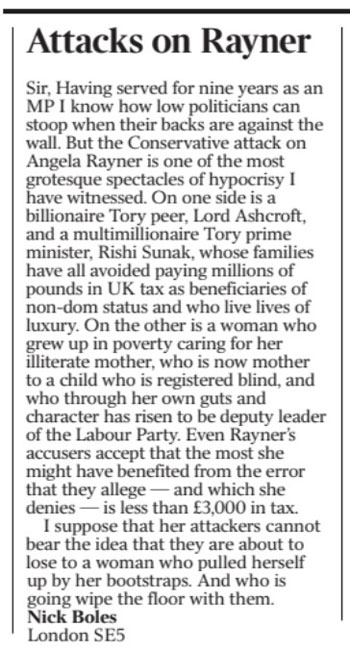
…and here is the paper the very next day splashing on the story for the second time in four days.

The headline suggests she’s in big trouble. Is she? Here’s the chief constable, quoted in the story explaining the announcement of an investigation was a “neutral act” and did not imply “hard or fast evidence upon which to base anything”. In other words, the Mail and the Tories have stirred the pot and now the police are looking to see if the stew has any ingredients. Which we already knew.
There’s no doubt that Greater Manchester Police putting a dozen or more officers on to this is a story. But whether it’s a “police look at multiple allegations” or an “outcry over police resources being used to chase Rayner” story is open to question. Because outside of the Fleet Street and Westminster bubble, it is the latter that dominates debate. And the only thing new here was the approximate number of officers involved.
Of course there should be probity in public life. Of course the principle is the same whether it’s a trifling sum or millions. If someone has made a complaint to the police, they have little option but to follow it up. It is open to Labour MPs to make similar complaints about Michelle Mone or even Rishi Sunak and his green card.
And, of course, it is reasonable to report that the police are investigating complaints about the woman who could be our deputy prime minister later this year. As the Times did on Saturday. But was this statement of the obvious – that the inquiry will cover all the allegations being flung around and not just a sample – the most important story in the world for the Times to tell its readers yesterday? More important than the smoking ban, Trump on trial, the wars in the Middle East and Ukraine, the moves to shut down the NatCon conference in Brussels, the ruling on prayer in schools? Really? Even the Mail didn’t splash on it (though it was obviously on the front). And when you’ve read it, turn to Matthew Parris saying, “Rayner’s only crime is being an uppity lass”. Cakeism.

Then, to cap it all, this morning the Times has a stonking exclusive about a Tory MP telephoning old ladies at three o’clock in the morning to ask for thousands of pounds to give to “bad men” – a story that sets hares running in all directions – and it leads on interest rates perhaps not going down as quickly as some hoped. Not only that, it gives an inside spread on Rayner precedence over its own Mark Menzies investigation. Give me strength!
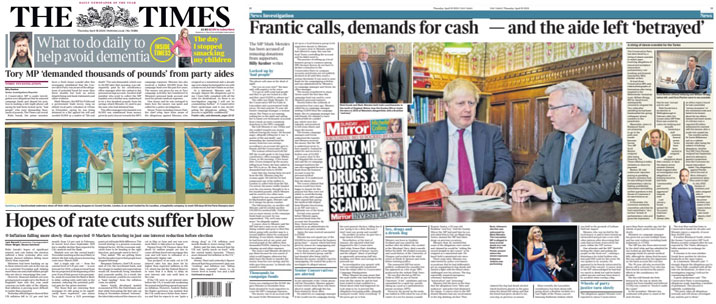
All that said… I started this Notebook bemoaning the complete absence of journalistic effort by all of my local media outlets. The byline “Glen Owen investigates” usually fills me with dismay. The journalism that he – and his colleague Andrew Pierce – produce leaves a nasty taste in the mouth. But, dislike it as I may, it is journalism and I have to applaud the fact that both of them do knuckle down and do some digging. They (or their researchers) put in the effort and their employer invests in that research.
I just wish that it wasn’t founded in malice and that their energies were directed at real scandals that affect real people’s lives.
In other news… WW3 comes one step closer

The Mail’s obsession with Rayner has been such that she has been the lead story for the Sunday paper three weeks in a row. And it has now reached such a pitch that even the Iranian attack on Israel that could send the world into a very dark place indeed could not budge her from the top slot. It simply replaced a Bondi picture (focused on Kate and Wills, of course) with an Iranian one.
That was a monumental misjudgement, but it was not alone. The Express and People missed the Israel story altogether. Let’s be kind and put it down to early deadlines. The Mirror stuck with “Fury at Meghan bro’s sick YouTube vids”, managing only 172 words on “Iran drone reprisals” on page 12 of the third edition. The Sunday Times kept faith with Murdoch’s new fave Kemi Badenoch having her say about gender wars, slotting the drone strike into a top single on the front.

But there were proper journalists on duty on Saturday night. The Observer made it the splash for the third, and the Sunday Telegraph went one better, downgrading Sunak talking about the ECHR and a Grand National pic to give the attack two-thirds of the front on the slip. So did the Sun, which changed up from an inconsequential lead on “Cowell backs Amanda in Sharon storm” to give over the front page to “Iran in missile blitz on Israel”.
Some deaths are more newsworthy than others…

What a pity that the next day it had to go all jingoistic with “RAF top guns foil Iran blitz”. There is no doubt that the UK played a key part in the defence of Israel, but sometimes it doesn’t all have to be about us. The bigger story was the world on tenterhooks dreading what Netanyahu might do next.

But sometimes we can’t help ourselves, can we? Last month, when the IDF killed seven aid workers, the Mail and Express – which had previously characterised people demonstrating against Israeli airstrikes as “hate marchers” – both splashed on the three Britons who died in the attack, while the Telegraph had “PM demands answers after Israel air strike kills Britons”. For the Sun, two of those Brits had to play second fiddle to the “SBS hero” killed in Gaza strike.
Quite apart from the disconnect in the reporting of 33,000 Palestinian deaths against those of our three aid workers, one wonders how hard it is to have compassion for people who aren’t British – to the extent that we also discount Australians, Poles, Canadians, Americans? The Telegraph didn’t mention the nationalities of the other dead charity workers until its final paragraph.

Not hard at all. The Mirror, Times, Guardian and i all managed all-encompassing heads, bringing in the domestic interest in the subhead or strap with a variation on “Brits among…” or “aid workers, including three Brits…” That’s the way to do it.
Hugh Grant wins “enormous” sum

I wrote earlier about Mr Murdoch being personally involved in settling Michael Ashcroft’s libel action out of court, about how the total legal costs for the case were estimated at around a million pounds, and about how each side paid their own bill. Yesterday, representatives of the Murdoch empire settled another case out of court, a case in which lawyers’ bills might have reached ten times as high and fallen on just one side – even if that side had won.
Hugh Grant, one of the most vehement and dogged campaigners against elements of the Press, settled his law suit against the Sun for what he described as an “enormous” sum – which was presumably an awful lot, since the usual phrase is “substantial”. This was in spite of his desire to have his claims of phone hacking, burglaries, landline tapping, bugging of his car and blagging of his medical records tested in open court.
He had no choice, he said, because News Group Newspapers had offered him so much money that if he had proceeded and won, he still risked facing a bill of £10m if the judge had awarded him even a penny less than the sum on the table. That’s the way the system works. It’s designed to help rather than impede justice, to save courts time and litigants lawyers’ fees. But when one side has much deeper pockets than the other, it can also mean the suppression of wrongdoing.
This is a big concern of journalists, who complain about so-called SLAPP libel cases – “strategic lawsuits against public participation” – where very wealthy individuals or, more often, corporations institute proceedings to stymie investigative reporters who look too closely into their affairs. “We can’t afford to take the risk,” they cry. “It’s not in the public interest.” They also get quite shirty about the use of NDAs.
Yet these are exactly the tactics the Murdoch empire has been using for more than a decade to avoid the detailed allegations of what went on in Wapping at the beginning of the century coming out in court. In the financial year ending in 2022, the fallout from the scandal cost it £128.3m; last week, its results showed that expense had fallen to £51.6m last year. Quite a drop, until you set it against the Sun’s 2023 losses – £66m – and also remember that the total hacking bill is estimated to be more than £1bn and counting.
News Group continues to insist that wrongdoing was confined to the defunct News of the World and that it had apologised in 2011 for what went on. It refuses to accept that the Sun was culpable. Yet it pays out “enormous” sums in damages for doing nothing wrong? Not only to Grant, but previously to Sienna Miller and Chris Huhne, who both reached the same conclusion as Grant – they had been offered so much money that they simply could not take the risk of financial ruin that continuing the fight would entail.
So News Group stands like a prize fighter, bruised and battered, but still upright after knocking out all-comers; bouncing on the balls of his feet, challenging “Who’s next?” Well, we know who’s next: Prince Harry. He, too, has repeatedly stated his determination to fight on, but yesterday his lawyer – David Sherborne, who also represented Grant and others – admitted that he, too, might have to give up. And if he does, that will be it. News Group will have spent a fortune not on proving its innocence, but on concealing the level of its guilt, which may be greater than it concedes or less than critics contend. And in the meantime, it continues to blacken Harry and Meghan’s characters whenever it can, in order to dissipate any public sympathy for the couple who blame the press for driving them out of the country.
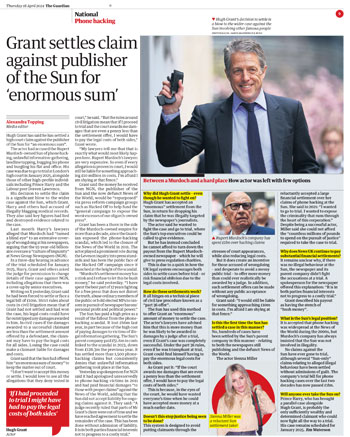
And it’s not just News Group behaving like this. Most of our newspapers take the same attitude. Because Harry is after the Mail and the Mirror as well. This morning, the Hugh Grant settlement appeared on one front page – one that doesn’t appear on the newsstands. The Independent has been online-only for years, but it still produces a “front” to show on the paper reviews and suchlike. A photograph of Grant dominates today’s edition. The Guardian gave the story a full page – as it would – while the Telegraph, Times, Mail and i reported the settlement inside, each giving it about 200-300 words.
The first three of those four all focused on “Harry may give up fight”, which makes a sort of sense because celebrities settling for a lot of money is now a bit old hat (which is what News Group wants everyone to think – “oh just another one, will it never end?”) while the Prince surrendering would be a Big Moment.
With the ramifications for the Sussex case, the “I can’t afford £10m”, and the News Group “We don’t admit liability” statement, there was little space for what else Grant had to say yesterday. Which was a pity, as it makes interesting reading. You can see it here.
Funnily enough, the Telegraph appears to have started out writing the story angled on yesterday’s settlement, with the headline “Hugh Grant settles hacking claim ‘for enormous sum’ to avoid £10m legal bill”. But that doesn’t seem to have made it to print, for the story that actually appeared at the foot of page 7 had a different intro, under the headline “Duke of Sussex may be forced to settle Sun case over ‘impossible’ legal fees, lawyer says”. These things happen in newsrooms. Stories get rewritten when executives look at proofs and think the writer / subs have missed the real story. Nothing wrong with that. Just interesting.
And what did the Sun, the paper at the heart of it all, and the Mirror, which settled with Harry a couple of months ago, have to say about Mr Grant? Or the Mirror’s Express and Star stablemates? Nothing. Nothing at all.
The will of the people?

When not looking out for its elderly readers, the Express continues its agenda of promising a rosy future under Rishi and co, and stamping its feet over migration. On the promising front since we last met, we’ve had “PM: buckle up! Britain is ready for economic take off” and “Hunt: We’ve done the hard yards…now I will cut taxes and bet on growth”.
Meanwhile, today’s is the fourth migration-based splash this month (one is about an ECHR ruling on climate, but this is essentially seen as “proof” that it shouldn’t be able to stop our Rwanda policy). If you have hobby horses, I suppose it’s fair enough to ride them, even if others don’t share your view.
It is, however, misleading to characterise the ECHR as a “euro court”. It may have European in its title, but it is nothing to do with the EU (contrary to what the Express wants readers to think) and nor is it a “foreign court”, as some ministers and Suella Braverman say. It is an international court, which is not the same thing at all.
Whatever, “euro court” is not actually a lie. But this morning’s splash headline is something else. We have an elected government under a prime minister put in office unopposed by a tiny self-selected electorate. That prime minister claimed that his position was validated because he would continue to operate under the mandate given to Boris Johnson when he won by a landslide in 2019. He would, he said, abide by that election manifesto. The thing is, that manifesto said nothing about sending asylum-seekers to Rwanda, a policy dreamt up post-election when Priti Patel was home secretary.
Yes, “the people” gave the Conservatives a majority, but they didn’t give them the authority to do whatever they chose once in power; they gave them instructions to do what they had promised. Opinion polls suggest that they have since decided they’d rather not have the Conservatives there at all, but there’s not much they can do about that at the moment. The polls also show that “the people” aren’t too keen on the Rwanda policy.
To accuse the Lords of “defying the will of the people” is just plain wrong. If anything, they are voicing it.
OJ or Pompeii
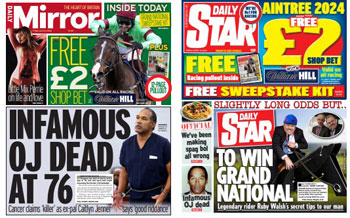
It was no surprise to see OJ Simpson on almost every front page last week and as the splash in the Mirror and Sun. I was struck by the choice of the word “infamous” in the Mirror and Star headlines as it seemed sort of quaint. But where was he on the Times cover? Wasn’t he the nailed-on pic for everyone, not just the tabs?

Well, no. And hurrah for the Times for choosing a far more significant picture than a man whose face will have been familiar to most. It went for a fresco from Pompeii depicting Paris meeting Helen of Troy. It is a truly stunning image, glorious in its execution and colour. And it is 2,000 years old. Two thousand years! There was more on the 14-15 spread, which was dominated by an even more stunning picture of Apollo and Cassandra. And another of Leda and the swan. Glorious.
A lot of digging goes on at Pompeii, wondrous things are discovered. These latest ones are the subject of a BBC documentary that was aired on Monday. The Times credited the programme, but also did its own reporting and graphics. The Guardian and Mail put the pictures on page 3, the i on page 13. Others couldn’t be bothered.

This is such a shame because it demonstrates how prosaic our papers have become, how they have lost their sense of wonder. The Telegraph’s run of main news pictures that day were of OJ, the Red Arrows flying over Lincoln Cathedral, snails in an RSPCA video, Angela Rayner, a scene from the Night Manager, a postage stamp, a murder victim (female), a torpedo, women dressed up for Aintree (at least it didn’t call them “fillies”), and a statue of Winston Churchill. Of course there’s no room for Pompeii when you’ve got all those goodies.
The Times’s front and spread lifted my heart more than anything because it showed that, even while it has foot soldiers fighting in confected culture wars, it still has an understanding of the importance of real culture to the soul.
Sun, sea and problematic medical procedures

Like London buses… you wait for one exclusive about medical treatments in Turkey and then two come along at once. At first glance, I thought this was another case of two papers claiming the same story as exclusive. But, no, these are similar but different – and both very good stories. What are the chances?
Front page of the fortnight
For being speedy off the mark, for reconfiguring the titlepiece and minimising the puff, and for recognising that this was a “moment”, it’s the Sun wot wins it.

Liz Gerard’s Notebook is a fortnightly column published in the InPubWeekly newsletter. To be added to the mailing list, enter your email address here.












